One of the amazing things about Cookie Connection is that you can find quite literally tens of thousands of cookie clips from which to draw inspiration or learn new techniques. Clips are categorized into dozens of unique sets to help make it easier to find cookies that include a particular medium or technique.
Fondant, which can be found in the Fondant/Modeling Chocolate-Topped Cookies clip set, is one of those mediums that, in my opinion, is definitely underrated when it comes to cookie decorating, especially since it is such a versatile medium. Fondant can be rolled, sculpted, modeled, embossed, cut, painted . . . the list goes on and on. I'll talk about some shaping techniques in a bit, but this decorating range is what makes fondant the perfect topic for a Practice Bakes Perfect challenge!
Before I mention the details of this challenge, let me just say that I have a couple of surprises this time! These extras are bound to make this challenge more interesting than usual, especially for veteran challengers! And because Julia and I want to encourage as much participation as possible, we're also giving you more time to create. The challenge will close after the New Year, so you can get through your holiday orders with ease! Back to those surprises . . .
The first one relates to our amazing prize that is awarded to one randomly-drawn entrant. This time, one of our very own Cookie Connection members, @LisaF, has stepped up and offered to give back to this community by sponsoring the prize - a very generous $100 gift certificate to BakeDeco.com. As you may or may not know, BakeDeco.com is a great one-stop shop for all baking and decorating needs - one that both Lisa and Julia rely on quite a lot. THANK YOU, Lisa, for donating this fantastic prize. [EDITOR'S NOTE: Yes, my personal thanks to Lisa as well! I was so pleasantly surprised by her offer to donate the prize! It's terrific to see a member supporting other members in this way, and such a help to me to have a month off from rounding up prizes! How thoughtful of Lisa! 😘 ~JMU]
IMPORTANT NOTE: As with all of the gift cards that are donated, this value is applied to your total order and is capped at $100. So if you purchase $100 worth of product, it will be covered, but your shipping will not. VAT is also not covered. Other geographical shipping restrictions may apply, and we'll alert you if they're known in advance.
And now, on to the details of our challenge . . .
What is Fondant?
Fondant is a type of icing typically made of powdered sugar, vegetable fat, gelatin, glucose or corn syrup, and glycerin. It is most commonly used for modeling, sculpting, and covering cakes, cupcakes, cookies, and other baked goods. Fondant comes in several different forms: rolled fondant, poured fondant, sculpting fondant, and gumpaste fondant. This post on the Bob's Red Mill blog, as well as this post on the bakingo.com blog, further explain the different types of fondant and their uses. Rolled fondant is generally what's used when decorating cookies due to its excellent workability. (For the purpose of this challenge, we will NOT be using poured fondant; we will only be using rolled fondant.)
Getting Started
If you're new to working with rolled fondant, I highly recommend reading this post on the Satin Ice website, which offers important tips to know before getting started. It includes information about essential tools and handling and storage of fondant, as well as troubleshooting tips. Likewise, this Wilton video also offers useful tips for working with fondant.
In addition to using store-bought fondant, you can make your own! Good news: there are countless recipes online showing different ways to make fondant.
This blog post by Gemma's Bigger Bolder Baking offers a video tutorial showing how to make classic fondant from scratch. In case you don't have all of the necessary ingredients on hand (glycerin and glucose can sometimes be hard to find in the US), Gemma also has a recipe for marshmallow fondant that requires only three ingredients plus water. Both tutorials offer some valuable tips for working with fondant.
There's also this great video tutorial from Rosanna Pansino showing how to make, color, and store marshmallow fondant.
This tutorial by Sugar Geek Show, with accompanying video, offers a recipe that combines store-bought fondant with homemade fondant, which, according to Sugar Geek founder and host Liz Marek, is the "ultimate fondant" since it combines the great taste of homemade marshmallow fondant with the workability of store-bought fondant.
I also found this marshmallow fondant recipe and video tutorial from Craftsy that use melted chocolate to give the fondant improved workability (and I imagine more working time).
Again, these recipes are just a few of the many you can find online, and, in full-disclosure mode, neither Julia nor I have tested any of them. That being said, I encourage you to take a look at these links and other recipes; then test a few yourself to see what works best for your cookie projects.
Ideas and Inspiration
When it comes to fondant, one might instinctively turn to the cake decorating world for design inspiration, and justifiably so. There are myriad cake designs and techniques from which to draw inspiration. But inspiration can also be found in the cookie decorating world. Here on Cookie Connection, you will find thousands of cookies that incorporate fondant into their designs. And online searches can yield even more fondant-topped cookies. Of course, there is also Cookie Connection's resident Queen of Fondant, @Lorena Rodríguez, which brings me to the second surprise of this challenge! As an added bonus, Lorena has agreed to be a guest judge this time! Thank you, Lorena! Your critique and feedback will be of great value.
If you've seen any of Lorena's work, you know that her skills and talent are unsurpassed when it comes to decorating cookies with fondant. Lorena has turned those wonderful cookie decorating skills into a successful business named Lorena's Sweets. Make sure to check out the recipes and instructions page on her site for some great tips for working with fondant molds. I also recommend that you check out her cookie portfolio here on Cookie Connection to see just how versatile this medium is and the stunning results that can be achieved.
You'll see additional inspiration from other talented Cookie Connection members as I get into discussing the decorating (or shaping) techniques for this challenge below.
Fondant Shaping Techniques
A quick online search will show you that there are countless ways to shape fondant, but these six shaping techniques are the ones I want you to focus on for this challenge. You can tint, dust, airbrush, or apply coloring to the fondant however you want.
Fondant cutouts (aka appliqués) are created by cutting out pieces of rolled fondant to specific shapes. This Wilton video demonstrates this process and shows how to adhere cut fondant pieces to a cookie (or to other sweets) using an edible adhesive such as piping gel or royal icing. [EDITOR'S NOTE: I like to think of two types of appliqués: (1) conformable ones that are applied to cookies while the fondant is pliable, so they conform to, or fit flush against, the cookie surface and (2) unconformable ones that are allowed to dry before being placed on cookies. Once dry, an unconformable appliqué can be positioned to hover above or even hang off the cookie. Unconformable appliqués can also be contoured or otherwise shaped before drying to hold unique 3-D forms. ~JMU]
Embossed fondant is achieved by using a texture mat, textured rolling pin, stamp, or other embossing tool to press a decorative pattern into fondant. This video tutorial by Its A Piece Of Cake explains the process of creating an embossed look on fondant.
Molded fondant involves pressing fondant into a mold, often made of silicone for easy removal, to create a dimensional decoration. In this video by taste bakery, you'll learn several tips for creating fondant decorations using silicone molds.
Extruded fondant shapes are created by forcing fondant through a fondant extruder, basically a tube with various disk attachments that fit on the end. The disks have openings of different sizes and shapes that allow you to create a wide variety of long cord-like pieces that can be left straight or further shaped. Here is a great video by Cookies Cupcakes and Cardio that explains and demonstrates this technique.
Modeling can mean different things to different sugar artists, but, for the purposes of this challenge, it refers to shaping fondant by hand into an often 3-D form. This video by I Scream for Buttercream shows how to hand-shape delicate fondant roses using an easy no-tool technique.
Sculpted fondant is fondant that has been transformed into a 3-D decoration using fondant sculpting tools, of which there are several. In this video by Just Cake It, you will see both simple and advanced methods for sculpting a face. You can learn about the various tools used for this technique and see demonstrations of those tools in this video by Suzi Witt as well as this video by Ovaniz.
Of course, fondant can be shaped in any of these six ways, and then applied immediately to cookies (to conform to them) or dried first (often for more dimensional effects), as Julia explained above.
Since the cookie design that you will create for this challenge will be unique to you, I will leave it to you to research the tools and techniques that are best suited for your entry. However, I have included a few cookie designs below, all from Cookie Connection's Fondant/Modeling Chocolate-Topped Cookies clip set, that clarify how some of the techniques just described can be applied to cookies. You'll find additional inspiration in the clip set.
This set is a great example of the cutout or appliqué technique. Note how Lorena has pieced together - and even layered - many small shapes to end up with three very cohesive designs.
Happy Fourth of July by Julia M. Usher This cookie also uses the appliqué technique for the message plaque and Statue of Liberty. However, the cutouts were pre-dried and do not conform to the cookie. Instead, the message hovers slightly over it (though hard to see) and Lady Liberty extends far over the edge, adding drama! This cookie also incorporates two other fondant techniques: (1) extruding (flag post) and (2) modeling or hand-shaping (ribbons and bows). In this post also by Julia, she shows that cutouts needn't be flat. She uses contoured ones to add life to tropical flowers and leaves.
This cookie also uses the appliqué technique for the message plaque and Statue of Liberty. However, the cutouts were pre-dried and do not conform to the cookie. Instead, the message hovers slightly over it (though hard to see) and Lady Liberty extends far over the edge, adding drama! This cookie also incorporates two other fondant techniques: (1) extruding (flag post) and (2) modeling or hand-shaping (ribbons and bows). In this post also by Julia, she shows that cutouts needn't be flat. She uses contoured ones to add life to tropical flowers and leaves.
Because a Cookie is My Canvas by Tina at Sugar Wishes This platter is a wonderful example of both molding and embossing. As Tina's set demos so well, fondant can be molded or embossed with texture mats, and then applied as large solo designs (butterflies) or in more abundant repeating designs (flower bouquets). She's also shaped and pre-dried some fondant elements, like the butterfly on the rose, to create added lift.
This platter is a wonderful example of both molding and embossing. As Tina's set demos so well, fondant can be molded or embossed with texture mats, and then applied as large solo designs (butterflies) or in more abundant repeating designs (flower bouquets). She's also shaped and pre-dried some fondant elements, like the butterfly on the rose, to create added lift.
This set is a great example of how molded fondant (leaves, acorns, flowers, and berries) can be combined with clever shading techniques to produce very realistic results. Lorena also used circular cutouts for the pie tops and woven (modeled) fondant strips for the lattice work.
3-D Clutch Purse by Cookies Fantastique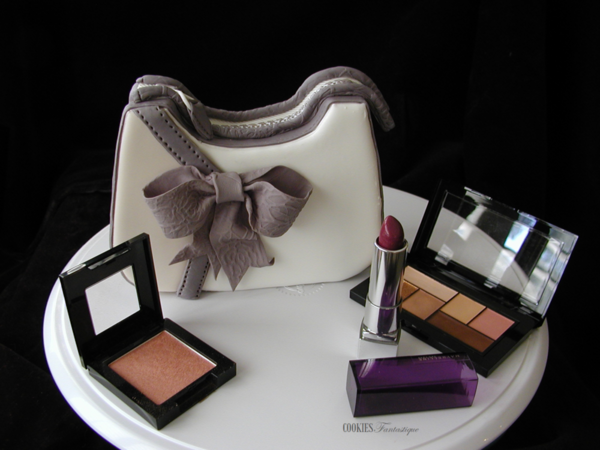 As this piece demonstrates, fondant is an excellent medium for 3-D cookies. It makes relatively easy work of smoothly and completely covering odd shapes that would otherwise be impossible to outline and flood. Carol also used embossing, in two ways, to take this design to the next level: first with a texture mat (bow) and then with a tracing wheel (stitching on the ribbon accent).
As this piece demonstrates, fondant is an excellent medium for 3-D cookies. It makes relatively easy work of smoothly and completely covering odd shapes that would otherwise be impossible to outline and flood. Carol also used embossing, in two ways, to take this design to the next level: first with a texture mat (bow) and then with a tracing wheel (stitching on the ribbon accent).
La Ratita Enamorada by UKUKI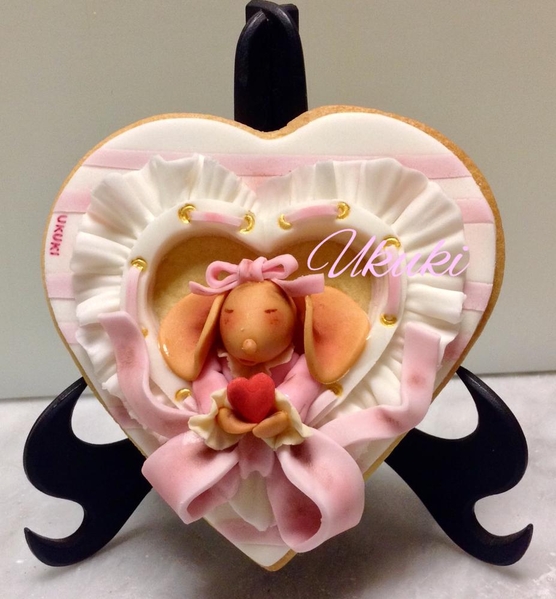
Even on a flat cookie, an impressive 3-D design can be achieved with the use of folded, ruffled, or otherwise modeled fondant. Much of this design looks like it was hand-shaped, but perhaps @UKUKI can tell us if she used any sculpting tools?!
Another study in creative mold use! Stunning results such as Lorena's can be achieved by layering several different molded pieces (leaves, birds, and flowers) in a thoughtful way. Her use of both tinted and dusted fondant adds depth and realism to the set as well.
Pretty in Pink by Teri Pringle Wood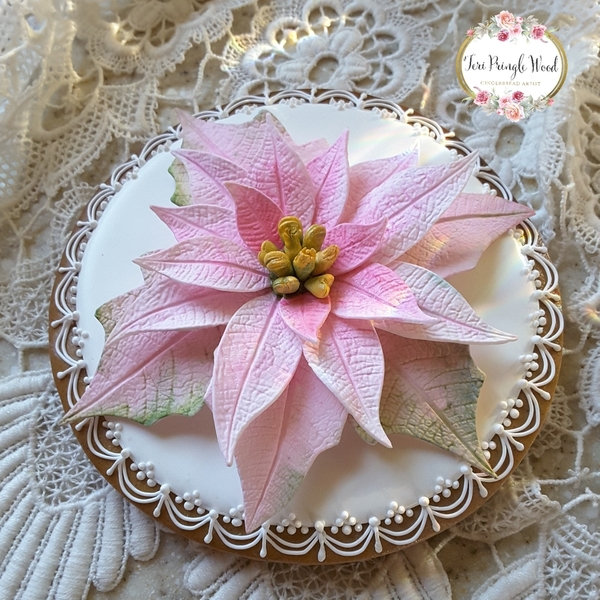 Sometimes less is more. This decorated fondant cookie uses only molded foliage and a few dust colors, yet the results are nothing short of stunning.
Sometimes less is more. This decorated fondant cookie uses only molded foliage and a few dust colors, yet the results are nothing short of stunning.
As you can see, fondant is truly a versatile medium that can take your cookie decorating to a whole new level. So, whether you consider yourself a pro or are trying this medium for the first time, I encourage you to experiment and challenge yourself with new ideas and different techniques. And, remember, inspiration can be found everywhere, not only in the baking world but wherever you look!
RULES:
PLEASE READ THEM CAREFULLY. I would hate to disqualify an entry because someone failed to read ALL of the rules.
1. Create a set of at least three (3) cookies where fondant is the sole medium used (apart from colorings and edible "glue" used to attach the fondant).
2. Choose a theme for your set, and let us know what that theme is in your comments under your post.
3. You must use a minimum of three (3) different fondant shaping techniques (i.e., cutout, molded, embossed, extruded, etc., as described above), and list those techniques in your comments under your post.
4. Everything on your entry MUST be edible.
5. All tools used to shape, mold, and otherwise create your fondant cookies MUST be food-safe.
6. Your design/set MUST BE ORIGINAL and NOT a copy of any other artist's design. And, remember, no copyrighted designs may be used without written permission.
7. As always, we ask that you make a brand new cookie design/set for this challenge.
8. And because Cookie Connection is all about learning and sharing, again, please tell us in your comments which fondant shaping techniques you used, which fondant types(s) you used, any tutorials that you found helpful, and what you learned along the way.
TO ENTER:
- Please post an image of your entry to the site under the Practice Bakes Perfect clip set no later than January 2, 2022 at 5 pm central. Again, we are giving you extra time to create for this challenge, as we know how busy you are likely to be with holiday cookie orders and/or other holiday prep!

- Because these challenges are ongoing, we ask that you put "Practice Bakes Perfect Challenge #49" in your photo caption AND in a tag, so that we can tell the challenges apart from month to month. Please use the main title field to uniquely name your cookies as you normally would.
- Please also assign other relevant clip sets and tags to your images, as you normally would (meaning don't just use the Practice Bakes Perfect clip set and leave it at that, or your photos won't easily be found with keyword searches).
- You can enter more than once, but please post only one clip of each distinct entry. Multiple clips of the same entry are not allowed unless added in a comment beneath the one primary clip.
The prize is given entirely at random. This means that everyone who participates in the challenge has an opportunity to be rewarded with this month's terrific prize!
After the challenge has closed on January 2, we will announce the random winner in the Saturday Spotlight on January 8. The next challenge will be announced about a week after that Spotlight.
And, remember, these challenges are NOT a competition. They are intended to inspire and motivate you to step outside of your comfort zone, to experiment and be creative, and to try something new. The goal is for you to challenge yourself artistically and technically, and to develop your skills so that you may reach your full potential as a cookie artist. And, of course, the goal is for you to have fun along the way.
I can't wait to see what you create. If you have any questions about this challenge, or if you are looking for ideas, technical advice, or creative help - or if you just want to talk cookies - I would love to chat. You can leave me a comment below, or you can send me a private Cookie Connection message.

 Christine Dutcher's journey as a cookier began in early 2013 when an online search led her to the amazing world of cookie decorating. After spending countless hours learning all that she could, Christine decorated her first set of cookies in October 2013. In 2016, she decided that she would begin to focus on perfecting her skills, challenging herself each time to create more detailed and progressively complex pieces of cookie art. In 2019, Christine became one of the very first sugar artists from around the world to be named as an "Honourary PME Five Star Sugar Artist" by Knightsbridge PME. You can learn more about Christine's work here on Cookie Connection, and by following her Facebook and Instagram pages.
Christine Dutcher's journey as a cookier began in early 2013 when an online search led her to the amazing world of cookie decorating. After spending countless hours learning all that she could, Christine decorated her first set of cookies in October 2013. In 2016, she decided that she would begin to focus on perfecting her skills, challenging herself each time to create more detailed and progressively complex pieces of cookie art. In 2019, Christine became one of the very first sugar artists from around the world to be named as an "Honourary PME Five Star Sugar Artist" by Knightsbridge PME. You can learn more about Christine's work here on Cookie Connection, and by following her Facebook and Instagram pages.
Photo credit: Christine Dutcher
Note: Practice Bakes Perfect is a bimonthly Cookie Connection blog feature written by Christine Dutcher that poses inspiration or challenges to get you to stretch as a cookie artist - for practice, for prizes, and for fun! Its content expresses the views of the author and not necessarily those of this site, its owners, its administrators, or its employees. Catch up on all of Christine's past Cookie Connection posts here.


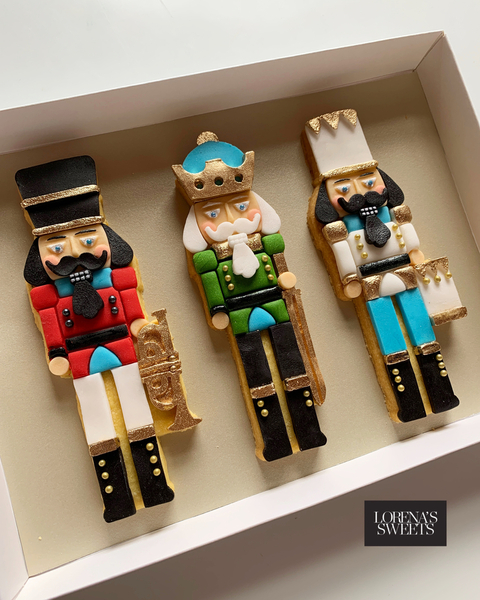

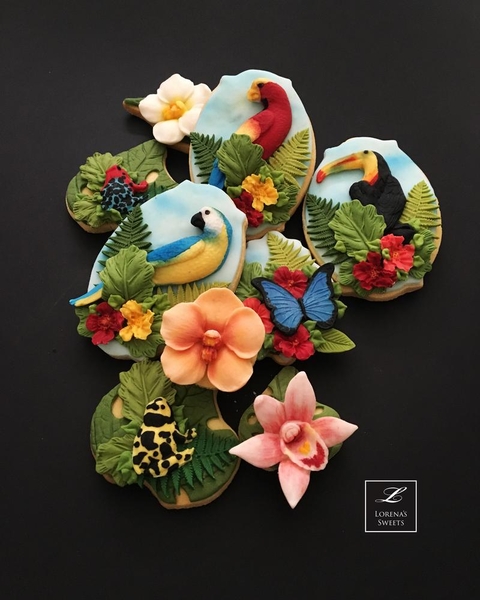
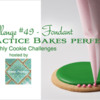



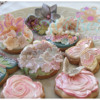
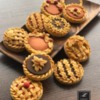
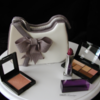
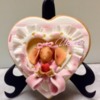
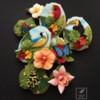
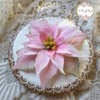
Comments (24)